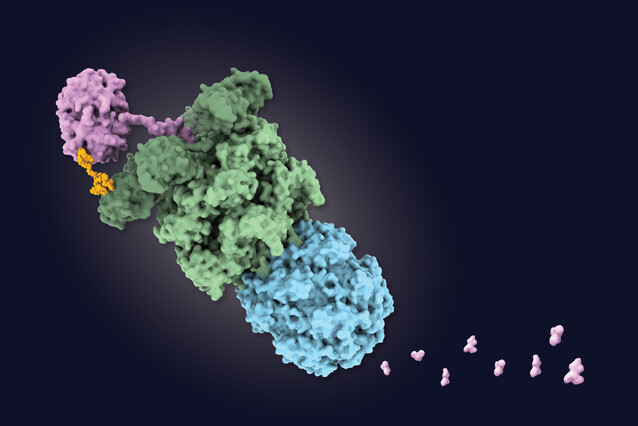BacPROTACs: antibiotics of the future

Bacterial infections cause hundreds of thousands of deaths every year. While bacterial epidemics are often restricted to low- and middle-income countries, the increasing emergence of antibiotic resistance makes the return of worldwide bacterial pandemics a very likely future and calls for urgent research into new antibiotic compounds. In a study in the journal Cell, scientists in the lab of Tim Clausen at the IMP and their collaborators have developed molecules that can target and degrade bacterial proteins selectively. These protein degraders, called BacPROTACs, can be adapted to target virtually any bacterial protein and could be further developed into an entirely new family of antibiotics.
While most of the world’s attention was turned to the COVID-19 pandemic, other infectious diseases have kept on claiming lives in the shadows. Diseases caused by bacterial infections such as tuberculosis, cholera, or typhoid fever kill hundreds of thousands of people every year.
Antibiotics – the antimicrobial molecules that target bacteria – have saved millions of lives in the past hundred years and experienced a booming development in the middle of the 20th century. However, through the processes of evolution, bacteria have rapidly started to fight back: by chance, some bacterial cells alter their DNA in a way that confers resistance to antibiotics. If resistant cells happen to roam the treated tissue, they are likely to spread and take over once their non-resistant neighbours have fallen.
The strong selective pressure caused by often over-used antibiotics has led to the emergence of many resistant bacterial strains, which threaten to cause global outbreaks. According to the World Health Organization, antibiotic resistance is one of the biggest threats to global health and food security, calling for urgent innovation: new antibiotics that are specific and adaptable once resistance arises.
In the journal Cell, scientists in the lab of Tim Clausen at the IMP and their international collaborators present an innovative, broadly applicable strategy pointing to an entirely new type of antibiotics: bacterial proteolysis targeting chimeras, or BacPROTACs. They show how these molecules can be designed to cause the selective degradation of virtually any bacterial protein, potentially leading to the bacterial cell’s death.
Hitting where it hurts: eliminating bacterial proteins
BacPROTACs are composed of two linked modules: a target-binding module, which selectively attaches to a protein of interest, and a degradation-inducing module, which tethers the target protein to a bacterial protein shredder that disentangles the target protein before chopping it up into pieces. In principle, these modules can be tweaked and adapted to degrade any protein in a bacterial cell – this could help develop a whole set of new antibiotics and mitigate the problem of antibiotic resistance.

In their study, the researchers tested their idea in vitro and in vivo on two groups of bacteria, Gram-positive bacteria and mycobacteria, which include threatening pathogens such as methicillin-resistant Staphylococcus aureus (MRSA) and Mycobacterium tuberculosis. The authors show that the BacPROTACs’ modular structure is versatile enough to be adjusted to different target proteins and different bacterial species, a promising finding for the future of antibiotic discovery.
“Our study shows that the BacPROTAC concept works: it’s adaptable and selective, which is exactly what we’ll need to combat antibiotic resistance in bacterial pathogens,” says Ester Morreale, postdoc in the lab of Tim Clausen and first author of the study. “Having provided the proof-of-concept for model targets, the next challenge will be to try it out on vital bacterial proteins and see how effectively it can kill a target species.”
A new technology with high medical and research potential
BacPROTACs have the potential to boost antibiotic discovery. Researchers could adjust the modules of BacPROTACs to degrade vital proteins in infectious bacterial cells, leading the pathogens to their death.
“The bacterium that causes tuberculosis has acquired resistance to several antibiotics and it’s currently the second leading infectious killer after SARS-CoV-2,” says Ester Morreale. “We urgently need effective drugs to treat this disease and I hope BacPROTACs can be adapted to do just that.”
While BacPROTACs represent a promising first step for the development of new antibiotics, they also provide a novel tool to understand the function of bacterial proteins. The controlled elimination of specific proteins allows researchers to understand the roles that these proteins play in the cellular environment – so far, this was only possible in other, larger organisms. Discovering novel vital proteins in bacteria could point to new drug targets that the BacPROTACs themselves could degrade.
“Our lab focuses on understanding the fundamental mechanisms of targeted protein degradation. It’s great to see possible medical applications of our research. Now our dream scenario seems to come true: having a novel, powerful handle against bacterial pathogens,” says Tim Clausen. “We started working on the BacPROTAC project in 2017 and it has been a long journey. It couldn’t have been possible without our great collaborators at Boehringer Ingelheim, the University of Duisburg-Essen, and Saarland University.”
Original publication
Francesca Ester Morreale, Stefan Kleine, Julia Leodolter, Sabryna Junker, David M. Hoi, Stepan Ovchinnikov, Anastasia Okun, Juliane Kley, Robert Kurzbauer, Lukas Junk, Somraj Guha, David Podlesainski, Uli Kazmaier, Guido Boehmelt, Harald Weinstabl, Klaus Rumpel, Volker M. Schmiedel, Markus Hartl, David Haselbach, Anton Meinhart, Markus Kaiser, Tim Clausen: “BacPROTACs mediate targeted protein degradation in bacteria”. Cell (2022). DOI: 10.1016/j.cell.2022.05.009
Further reading